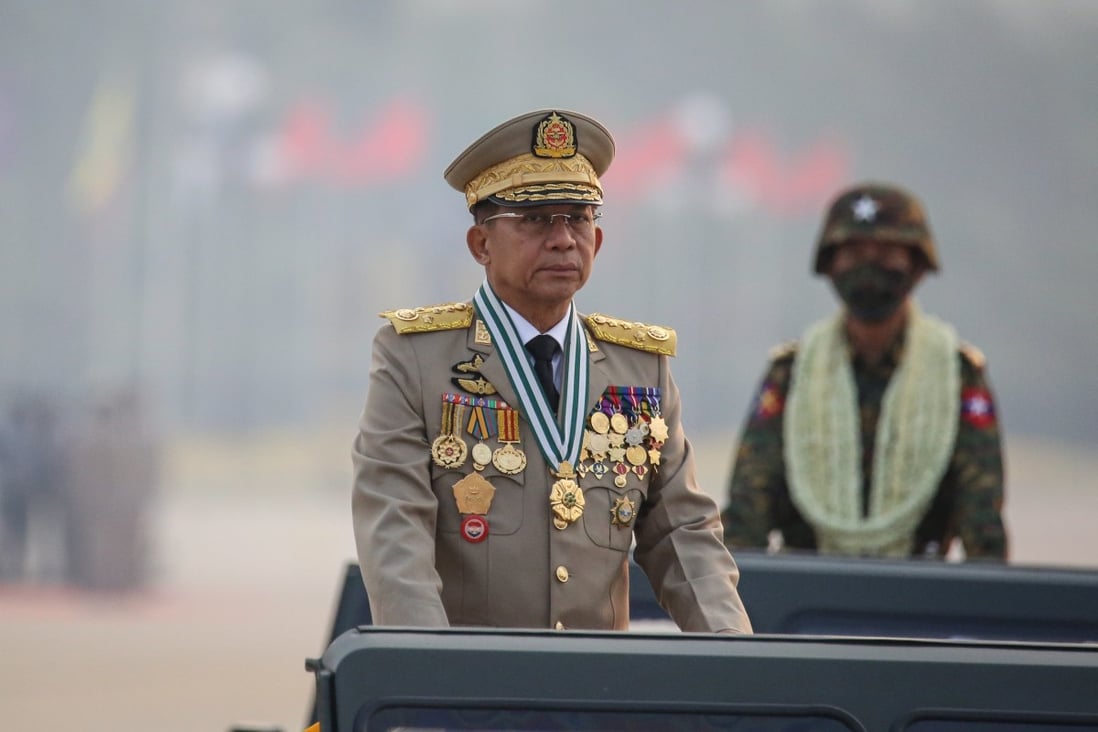
Senior General Min Aung Hlaing, the mastermind of the coup in Myanmar. Photo: EPA
By Barry Desker 24 May 2021
SYNOPSIS
As ASEAN leaders engage Myanmar’s junta in their bid to resolve the latest domestic conflict of one of its own members, they should brace themselves for a long game and a testing time.
COMMENTARY
DESPITE THE sound and fury from political leaders in Washington and London opposing the February 2021 Myanmar military (Tatmadaw) coup, Western states have very limited leverage with Myanmar.
After 25 years of cultivating access to the Myanmar leadership, including the military, ASEAN is better positioned to shape the international response to the Tatmadaw’s takeover.
ASEAN’s Dilemma
ASEAN itself faces a dilemma: Thailand and Vietnam, supported by Cambodia and Laos, have advocated for accepting the coup, in line with ASEAN’s traditional focus on non-interference.
Indonesia, Malaysia and Singapore condemned the use of force against unarmed civilians and pointed to ASEAN member states’ Charter commitments to act in ‘respect for fundamental freedoms, the promotion and protection of human rights, and the promotion of social justice’.
Doing nothing is not an option. The challenge is to deliver a cohesive ASEAN response.
At the special ASEAN summit in Jakarta on 24 April 2021, several ASEAN leaders did not refer to Min Aung Hliang as the head of the Myanmar State Administration Council. There were also references to major figures of the ousted regime, Win Myint as President and Aung San Suu Kyi as State Counsellor and Foreign Minister.
For ASEAN, the convening of a summit to discuss the coup marked a shift in its handling of such events. Previously, ASEAN would have accepted the change of government, even if some members were unhappy with the developments that had taken place.
Leaders’ Five-Point Consensus
The summit reached a five point consensus: an immediate cessation of violence and utmost restraint by all parties; constructive dialogue among all parties; a special envoy of the ASEAN chair to facilitate mediation; humanitarian assistance through the ASEAN Coordinating Centre for Humanitarian Assistance; and the special envoy to visit Myanmar to meet with all concerned parties.
A sixth point on the release of political prisoners was moved to the Chairman’s statement to avoid objections from Min Aung Hliang. Including it may have unravelled the consensus, given Min Aung Hliang’s trenchant criticisms of Aung San Suu Kyi, the National League for Democracy (NLD) and the conduct of the elections which saw the NLD overwhelmingly returned to power.
The UN Security Council has endorsed the ASEAN consensus. The UN Special Envoy for Myanmar Christine Schraner Burgener’s requests to visit Myanmar were ignored by authorities until she turned up at the ASEAN summit and a meeting was arranged with Min Aung Hliang.
The question now is how soon the Myanmar military authorities will permit a visit by the ASEAN special envoy.
During the visit, the envoy should focus on securing an immediate cessation of violence, the release of some political prisoners, access to leading political prisoners and the implementation of the agreement on humanitarian assistance. But Myanmar authorities will try to delay a visit ostensibly because ‘stability’ and ‘law and order’ need to be restored. A visit by Brunei, the current chair of ASEAN, will likely take place sooner.
Western Sanctions
Western states have pressed for sanctions on trade, investment, military exchanges and the supply of military equipment to Myanmar. When Western states called for sanctions previously, they excluded their most significant investments in Myanmar, including oil and gas investments by Total (France), Chevron (United States) and Woodside (Australia).
As Western investors are not significant players in other sectors of the Myanmar economy, their imposition of sanctions will not be taken seriously by the Tatmadaw.
Myanmar’s neighbours including China, India, Thailand and Bangladesh continue to trade with Myanmar, despite being unhappy with the coup. While Japanese and other Asian corporations have reduced or cut business ties with Myanmar military-linked corporations, their governments are unlikely to support Western calls for economic sanctions.
Myanmar’s two biggest military suppliers, China and Russia, maintain close ties with the Myanmar military and effectively blocked the inclusion of critical references and bans on arms sales in Security Council statements. Sanctions will only work if they are imposed by the UN Security Council. This will not happen as Myanmar is protected by the Chinese and Russian veto.
Persuading the Myanmar Military
Domestic resistance to the takeover or criticism from foreign governments and international civil society organisations will not deter the Myanmar military. It is an inbred military with limited access to external views and international trends.
The Tatmadaw will implement its hard-line domestic policy aimed at rooting out critics and crushing its opponents, while hoping that the current international and regional criticism of its actions dies down. The Tatmadaw has given ASEAN a hearing as it has found the grouping useful for engaging with regional neighbours. But ASEAN’s capacity to shape the Tatmadaw’s policies is limited.
It is a reminder that ASEAN is paying the price for including Cambodia, Laos, Myanmar and Vietnam between 1995 and 1999 without any conditions, following the end of the Cold War. ASEAN’s challenges are compounded by the decision of the drafters of the 2007 ASEAN Charter not to adopt the far-sighted proposal by the Eminent Persons Group (EPG) for measures, including suspension, if member states seriously breach ASEAN commitments.
Today, ASEAN’s influence lies in its capacity to persuade the Myanmar military authorities, not in the presence of rules which may or may not be enforced. This will be a long game and a testing time for ASEAN.
Barry Desker is a Distinguished Fellow at the S. Rajaratnam School of International Studies (RSIS), Nanyang Technological University (NTU), Singapore. He was the chair of the ASEAN Inter-Governmental Commission on Human Rights in 2018. This first appeared in East Asia Forum on 23 May 2021.
